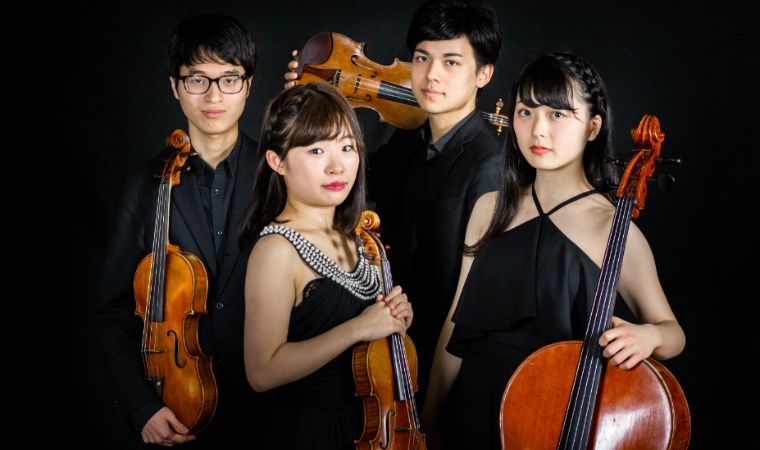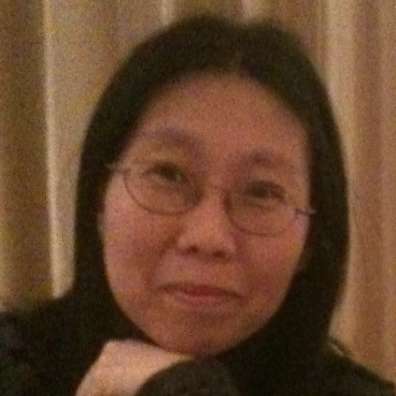There are several outstanding Japanese string players currently on the global music scene, but curiously, no Japanese chamber music group has really made a mark internationally since the Tokyo Quartet disbanded in 2013. Now, however, Tokyo-based Quartet Integra is quickly emerging as a group to watch out for after their emphatic win at the Bartók World Competition held in Budapest in October last year. What’s more, the quartet is being coached and mentored by the former players of the Tokyo Quartet at Suntory Hall’s Chamber Music Academy. I caught up with the members of Quartet Integra who talked to me about their studies at the Academy and about their ambitions.

The Quartet Integra was formed in 2015 when all four members were students at the Toho Gakuen School of Music. The group consists of Kyoka Misawa (first violin), Rintaro Kikuno (second violin), Itsuki Yamamoto (viola), and Anri Tsukiji (cello). String quartets are often formed at conservatories, but not many go on to have an active career. But the members of Quartet Integra knew early on that they wanted to explore this path, rather than to pursue solo careers.
In 2018, they were invited by Günter Pichler (formerly Alban Berg Quartet) to attend the Chigiana Summer Festival in Siena on a scholarship. “This was our first course abroad, so we didn’t know what to expect, but from day one we were thrown into the deep end,” Misawa tells me. “We weren’t prepared for the strictness of Mr Pichler’s coaching. He criticised everything we did, and made us realise how ignorant we had been about quartet playing until then. From him we learned what being a world-class quartet meant.” This experience strengthened the bond of the group and their determination to succeed as a quartet. Shortly after, they enrolled as fellows at the Suntory Hall’s Chamber Music Academy.
The Academy is a two-year course that can be extended up to two times, for a maximum of six years. The scheme is open to string or piano quartets and trios, and there are usually around six groups (called “fellows”) in a course. The Aoi Trio, winners of the ARD Competition in 2018, are also graduates. Quartet Integra is currently in the fourth and final year, and will graduate this summer. Understandably, the global pandemic disrupted some parts of the curriculum, but they are grateful that they could continue their studies and to rehearse, even when they couldn’t perform in public and competitions were being cancelled. If anything, these two years under Covid have made them more motivated.
“Before the pandemic, all the Academy fellows would come together two days each month, and we always prepared a new piece,” explains Yamamoto. “Generally all seven faculty members would attend, and we would listen to each other play. When the pandemic started, however, the coaching sessions became limited to one group at a time, so we weren’t able to mix with or learn from the other groups, which was a pity.”
The seven members of the faculty are director Tsuyoshi Tsutsumi (cellist and President of Suntory Hall), Shigeo Neriki (piano), Koichiro Harada, Kikuei Ikeda, Wakako Hanada (violins), Kazuhide Isomura (viola) and Hakuro Mori (cello). Eagle-eyed quartet connoisseurs will notice that Harada, Ikeda and Isomura are former members of the Tokyo Quartet, while the others are also hugely experienced chamber musicians.
“For me, being coached by Tokyo Quartet’s inner voice duo is invaluable,” says Kikuno. “It’s particularly fun when Mr Ikeda and Mr Isomura are coaching us together because they don’t always agree with each other about our playing, and often they start debating between themselves and it becomes more like their rehearsal. We enjoy observing this and hope we can be like them too – to maintain one’s opinion and not to compromise easily.”
For Misawa, Harada’s sound is something she aspires to. “As the leader of the quartet, I want to develop my own distinctive sound. When listening to recordings of string quartets, I can always recognise the sound of Mr Pichler from the Alban Berg Quartet and Mr Harada’s from the early recordings of the Tokyo Quartet. I too want to develop a sound that people would recognise as the Integra sound.” She also finds having pianist Neriki on the faculty is helpful, because he brings a different perspective. “He has a huge knowledge of the chamber music repertoire and the history of music, and rather than technical aspects, he often talks about the structure or the historical background of the piece, which is refreshing for us.”
Throughout the course, the groups have many opportunities to perform in front of the public, and one of the highlights is taking part in Suntory Hall’s Chamber Music Garden festival (CMG), which takes place every year in early summer. Normally the fellows perform in two lunchtime concerts, each presenting a 10-minute programme. But this year, Quartet Integra will give a special full-length concert marking their win of the Bartók World Competition. Yamamoto, who seems to be the brain behind the group’s thoughtful programming, explains to me: “We wanted to create an atmospheric programme centred on the Bartók fifth quartet, which we bring fresh from the competition. Since the second and fourth movements of the Bartók have a nocturnal feel, I felt they would go well with Dutilleux’s Ainsi la nuit and Mozart’s G minor quartet.” Integra has always included contemporary works in their programme, and they like to create a narrative that can draw the audience into the music.
They have also had opportunities to take part in other CMG concerts. In the Opening Concert of the 2019 festival, Integra cellist Tsukiji performed as a soloist in Vivaldi’s concerto for two cellos alongside Tsutsumi. “It’s not often that I get a chance to perform with the great Mr Tsutsumi, and with all my Academy fellows playing superbly in the orchestra, so it was an unforgettable experience. I learned so much from performing so close to Mr Tsutsumi and being embraced in his sonorous and rich tone.”
The quartet also has been coached by prominent artists visiting the CMG, such as the Kuss Quartet and cellist Kyril Zlotnikov of the Jerusalem Quartet. “When we played for the Kuss Quartet, we gave quite a dynamic interpretation of Schubert’s final quartet, and I remember they suggested that we should think more deeply about the meaning of each note and each harmony. It was a valuable piece of advice,” reminisces Yamamoto.
So, what has their win at the Bartók Competition meant to them as a group? Were they confident of winning? “In the final we thought we gave a strong performance, so we were hoping for a successful outcome,” says Tsukiji. The others also nod. “We got a lot of pent up energy during the pandemic, so we really relished the opportunity to finally perform in the competition. There was also a lot of expectation from the faculty members for us to succeed, so we would have been disappointed if we hadn’t won,” adds Yamamoto.
In fact, an accident happened in the first round – during their performance of Bartók’s fiery fifth quartet, Misawa’s E-string suddenly unraveled. Fortunately they had the composure to stop playing, and after a retuning, they played from the beginning again. “This had never happened to me before and it was such a shock. I was so relieved we went through to the next round – for me, everything seemed a bonus after that,” Misawa explains.
Currently the quartet is preparing for the upcoming Bordeaux String Quartet Competition in May and the ARD competition in Munich in September, which was postponed from 2020, in addition to their appearances at the CMG, which includes the Academy concert on 18 June.
What's next for Integra? “We hope to study abroad and subsequently to embark on an international career as a quartet, playing in many countries and venues,” say both Tsukiji and Misawa. Meanwhile, Yamamoto has loftier ideals. “I want to devote myself to the art of string quartet playing. Personally I have an ideal of what we want to achieve as a quartet, and I’m sure together we can succeed,” he says with quiet determination. Seven years into their journey, they are about to step onto the world stage.
Click here to find out more about the Suntory Hall’s Chamber Music Garden festival.
This article was sponsored by Suntory Hall.


